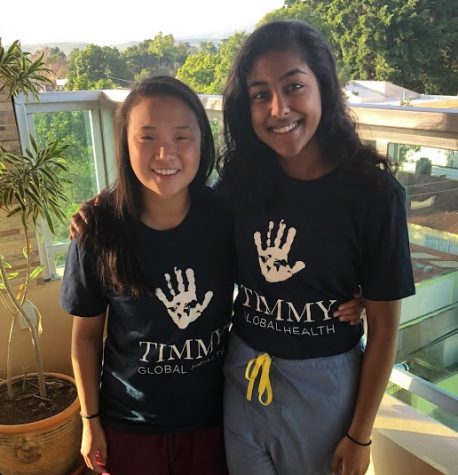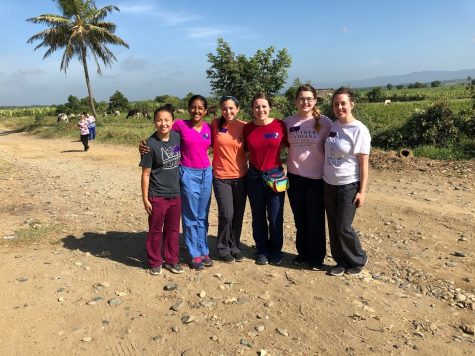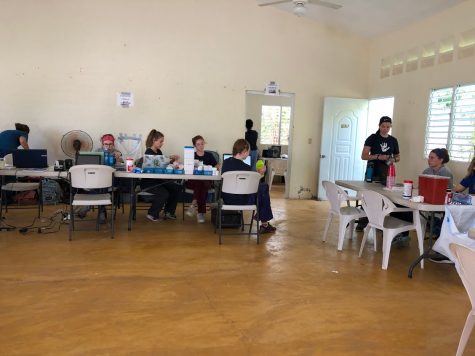Eagle expeditions: short term trip, long term solution

Nicole Nord spent a week in the Dominican Republic with 14 other students, seven of which were from the university. The team went through the Timmy Global Health organization.
Every week The Shield will feature a student who spent time in another country over the summer. This week, Nicole Nord and Lauren Branon shared about their time in the Dominican Republic with the Timmy Global Health organization.
Nicole Nord arrived at the airport in the city of Santiago in the Dominican Republic with her arms loaded down with medical supplies. The small airport was bustling with bodies crammed in every corner.
“It was kind of surreal,” the junior biology major said. “We had spent all year preparing and learning about the culture and we’re here.”
Nord, along with seven students from USI and seven students from Bellarmine University stayed in the city of Mao in the Dominican Republic through Timmy Global Health.
Timmy Global Health is an organization focusing on expanding global healthcare through volunteer work. The students stayed in the Dominican Republic from May 26 to June 3 and helped with the health clinics set up by the organization.
The health clinics were set up in different parts of the Valverde province. The purpose of the clinics was to provide basic health check-ups and prescribe medicine to the local population. Nord acted as a scribe for the doctors and communicated through a translator.
“A group of college kids will go over every three months to basically do the clinic, and we are able to track each person as they come through,” Nord said.
Nord said Timmy Global Health taught the students about the culture they would be living in before leaving. Nord said she learned about the health system in the Dominican Republic along with sanitation and infrastructure.
“We learned about what the environment was like there before we went,” Nord said.
Nord said a typical day included waking up around 7 a.m., leaving at 7:30 a.m. and driving out to the site they were setting up clinic that day. The students helped unpack the supplies for the clinic and set up the laptops and the stations.
Nord and the other students didn’t stop seeing patients until they left for the day at 4 p.m.
Nord said Mao was a very modern city. She said the hotel was much better than what someone would expect for a developing country. The hotel had air conditioning, WiFi, running water and nice beds.
Nord said many of the locals would gawk at her and the group and call them gringos, especially the children.
“At the clinics (the children) were super happy to come up and meet you because they had probably been to the clinics before and we play games with them,” Nord said. “People would just stare. But, locals as far as our translators went, were super kind to us.”
Nord said the data the group recorded through the clinics will go towards sustainability.
“It’s not like, ‘hey we’re here and we’re gonna help you out this one day and we’re gone forever,’” Nord said. “People will continue the work that we have done. We have all built on piece by piece to provide basic health care to places that wouldn’t have otherwise.”

Nicole Nord and Lauren Branon were two of the seven students from the university to go on the trip. The trip focused on bringing healthcare to developing countries.
Nord said she gained an appreciation for the basic things she has in America. She said she would recommend the trip to students, even the ones without health majors.
“I think it gives you the opportunity to just see new things,” Nord said. “It was an eye-opening experience, for sure. But I loved every minute of it and I would go back.”
Nord said the people she encountered in the Dominican Republic were some of the nicest people she ever met.
“I love my doctor that I got to work with,” Nord said. “He only spoke Spanish and I can speak enough Spanish, but we were still able to talk about the classes he took which were some of the classes that I took.”
Nord said they talked about organic chemistry and biological processes. She said it was easy to converse in Spanish with medical terms because some of the words were the same in Spanish and English.
“Even though there was a language barrier, I could still connect that way,” Nord said.
Nord said working with the translators and doctors was her favorite memory of the trip.
“They were passionate and they were, ‘get to it and get down to work and have fun doing it,’” Nord said. “Dominicans like to laugh a lot. They’re not super serious, so they were just good people to be around. They kept the day lively and they were just kind people.”
Nord said she experienced reverse culture shock when she first came back to America.
“It didn’t help that I went straight from this trip to vacation with my family,” Nord said. “I was just kind of overwhelmed by the amount of wealth and waste we have here compared to there. Some of those children will never eat a full meal, some of those children will never get to experience running water or clean water or all of those things we take for granted here.”
Lauren Branon, a junior biology and psychology major, heard about the Timmy Global Health Program when she was a freshman. She went to a meeting due to her interest in global health.
“I come from a really small town that’s not very diverse,” Branon said. “Anytime I got the chance to learn something new it was always really exciting for me, and global health encompassed that for sure.”
Branon said the trip was different from trips she took it the past. She went to areas that were impoverished due to it being a service trip.
“My first reaction was that this was definitely a lot different from home,” Branon said. “We got to tour some of the houses and to see the lives they lived compared to ours was so different. So, I guess shocked was my initial reaction.”
Branon said she helped with the little tasks that needed to get done every day.
“Even though I don’t have a medical degree yet or none of us were nurses or pharmacists, we were still able to go and help set up clinic and offer support to the patients,” Branon said. “A lot of times, a mom would come in with multiple children and we would be able to help entertain the kids and hang out with them.”
Branon helped with many tasks, like scribing for the doctors and helping set up Timmy Care. According to Branon, Timmy Care is the program Timmy Global Health uses abroad to document the history of each patient.
“That’s super important because a lot of the patients there might not even know their full name,” Branon said. “Most of them don’t know their birth dates or what medication they’re on because literacy is a problem there. The good thing about Timmy Care is that, by using this documentation, they don’t have to remember so much.”
Branon said every time a patient comes back in the future, the clinic will have their information documented from Timmy Care.

Nicole Nord and the 14 other student volunteers were in the clinics every day from 7:30 a.m. until 4 p.m. Students helped with basic tasks and served as scribes for the doctors.
Branon said working with the locals was her favorite part of the trip.
“During the downtime, when they weren’t seeing a doctor or pharmacist, we really got to know them and what it was like to live in that area,” Branon said. “We got to know their attitudes about the people they live around with because we were also really close to the Haiti border. We got to know how those different cultures interacted with each other.”
Branon said the translators were really willing to tell the students what it was like in the area and how they felt the work from the clinics impacted their community. She said the kindness and happiness from the locals surprised her.
“I think that you might expect a lot of negativity, given some of the circumstances they were in,” Branon said. “We saw people that were in pretty rough health shape and definitely impoverished. But they were some of the happiest and friendliest people that we met by far.”
Branon said she gained a better understanding of global healthcare equity and what things other places are missing compared to America and how other countries do health care differently.
“It definitely made me more passionate about the people in different areas,” Branon said.
Brannon said the trip helped her realize that everyone should have access to equal health care. She said she learned about short-term fixes and long-term fixes. She said organizations different from Timmy send groups that do well for one week and never come back again.
“That’s like putting a band-aid on something,” Branon said. “But Timmy, I feel like, is different because they focus on the continuity care as far as healthcare goes.”
Branon said it’s important to volunteer.
“This was something I could do to go an improve someone else’s life and to teach,” Branon said. “Now that I went on that trip, I can bring back the things I learned. And the best part, to me, about volunteering is not going and doing something for other people, but learning what other people can teach me. I think that’s a very invaluable experience.”
